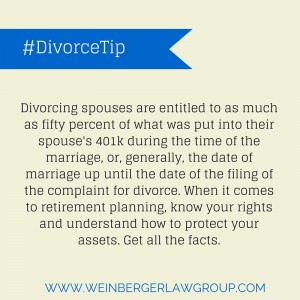Gray Divorce: Splitting Your 401K & A Lifetime of Assets
 Many people going through a divorce wonder what will become of their retirement plans, pensions or 401k accounts. Do you have to share your 401k with your spouse? Is your 401K account considered marital property? If it is a marital asset that my spouse is entitled to, how is it divided?
Many people going through a divorce wonder what will become of their retirement plans, pensions or 401k accounts. Do you have to share your 401k with your spouse? Is your 401K account considered marital property? If it is a marital asset that my spouse is entitled to, how is it divided?
Generally speaking, retirement accounts and plans, such as the 401k are seen to be marital property by the court in New Jersey and therefore can be subject to division in your divorce. As a reminder, New Jersey is what is called an “equitable distribution” state, meaning that your marital assets are not automatically split on a 50/50 basis. Rather, the court divides marital property on what they find to be fair, which may or not be 50/50.
With regard to 401k plans, the court looks at several factors when deciding if and how to divide the plan. First, the court looks at the duration of the marriage. Specifically, what was put into the retirement account during the marriage? Money put into a 401k before marriage is not usually subject to equitable distribution. Monies put into the 401k (either by your spouse directly or by his or her employer) during your marriage are subject to division. Divorcing spouses are entitled to up to fifty percent of what was put into the 401k during the time of the marriage, or, generally, the date of marriage up until the date of the filing of the complaint for divorce.
Once the court determines what time period to look at and how much of a percentage of the 401k should be given to your spouse, the court signs your judgment of divorce which will contain this information. Your attorney will then draft a Qualified Domestic Relations Order (QDRO) which tells the administrator of your 401k how to divide it to comply with the Employee Retirement Income Security Act. The family court judge must approve and sign the QDRO and the plan administrator must also approve it. The QDRO establishes your spouse as an “alternate payee,” an individual other than you who can receive payment from your 401k.
How your spouse receives their portion is up to them. They can either leave their share in your plan (the QDRO acts as a partition for their money as of the date of divorce), they can roll their share into their own 401k plan, or they can take a cash payout. It is important to note that taking a cash payout subjects the person to possible tax penalties. If your spouse leaves their share in your plan, they will begin to receive the retirement benefit when you retire.
QDROs can be complex. If you are concerned about the sharing of your retirement plan with your ex-spouse, our skilled family attorneys can offer you advice on what you can expect and how to best proceed with evaluation and eventual distribution of your retirement assets. Please contact us to schedule your confidential consultation.


